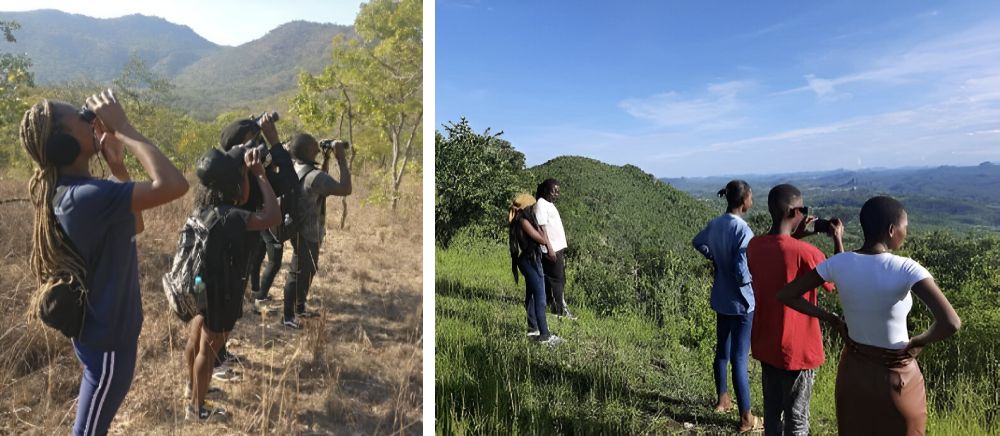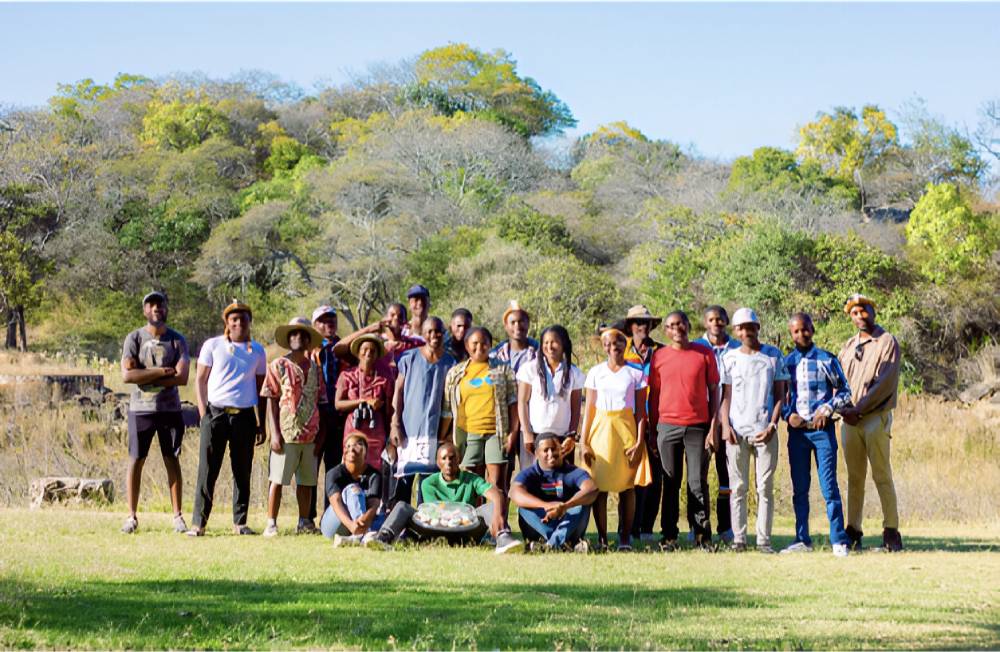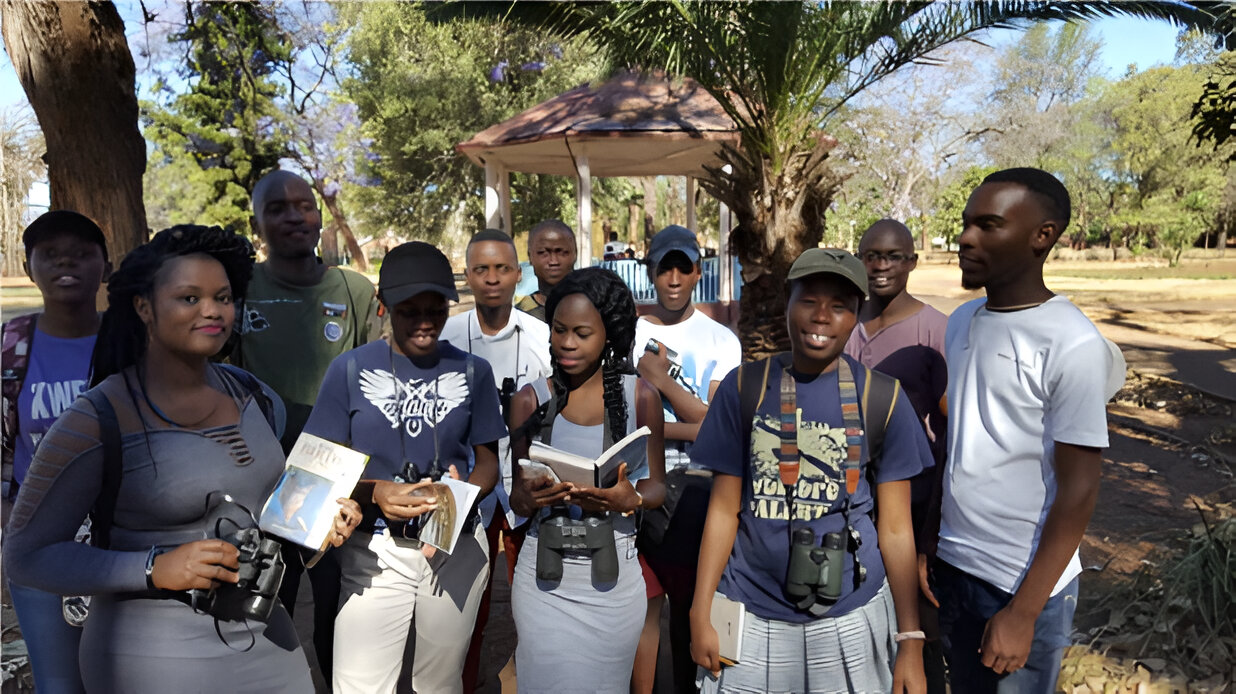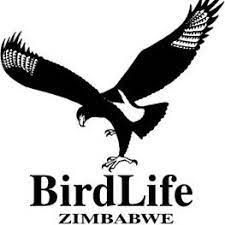CONSERVATION
Local Engagement & Empowerment
Development of Youth Clubs
The future of nature and bird conservation in Zimbabwe falls upon our youth. BirdLife Zimbabwe recognises the vital role that our youth needs to play in this arena, which led to the formation of three youth clubs.
The Mash Creepers started in 2014, with outings together with the Mashonaland Branch and to other areas, taking part in IWC waterbird counts and other surveys.
The Mash Creepers took part in the Marlborough Vlei Waterbird Count in July 2022. Six Mash Creepers and three Matabeleland Chirpers went to Nyangombe Safaris for a 2-night, 2-day camp from 5 – 8 August 2022. In February 2023, 3 Mash Creepers and 1 BirdLife BUSE conducted a waterbird count on Marlborough.
In October 2022, Ronnie Chirimuta (Mash Creepers Member) was awarded funding by the African Bird Club to conduct a project titled “Training BirdLife Bindura University of Science Education Youth Club Members on Bird Identification and Monitoring Mavuradonha Wilderness Important Bird and Biodiversity Area.” Visits were on the 20 – 23 February, 8 – 12 April, and 8 – 11 August 2023.

Training BirdLife Bindura University of Science Education Youth Club Members on Bird Identification & Monitoring
The Matabeleland Youth Conservation Society (MYCS), formerly Mat’land Chirpers, is the BirdLife Zimbabwe affiliate for youth in Matabeleland. It is an essential part of the conservation community in Matabeleland, taking part in surveys such as the Black Eagle Survey, IWC waterbird counts and the Southern Ground-hornbill Taskforce.
Our first meeting took part in September 2019 at Centenary Park in Bulawayo.
We have grown in our mission and reach as a club. As MYCS, our mission is to be a leading youth conservation network in Zimbabwe and on the continent, introducing young people to nature conservation, mentoring them into diverse career fields in the biodiversity economy and training them to be agents of change in their communities for the well-being of people and nature.
In our work, we aim to intergrate the focal themes of research, social enterprise, education and awareness and arts and culture with our conservation efforts. We believe mainstreaming conservation in these ways is the way in which we can drive behavioural and societal change and care for the environment while creating access avenues to conservation for young people in the country. Our work is largely possible because of our partnership with BirdLife Zimbabwe, who are our greatest supporters and mentors.
In May 2023 the first Arts and Culture Africa Day celebration at Hillside Dams Conservancy brought together youth and artists to showcase their wildlife and nature-inspired arts, surrounded by nature.
BirdLife BUSE (the Bindura University of Science Education) club began in 2016 in conjunction with Birdlife Zimbabwe.
In 2018 BUSE, in conjunction with the BLZ Youth Group, went on a social trip to Kariba and conducted a survey of the wetland area outside Bindura University Astra Campus. The intention is to institute monthly bird counts conducted by the students themselves.
BUSE has been involved in the project surveying Mavuradonha IBA mentioned above.
On the 18 May 2023, BUSE celebrated World Migratory Bird Day, the theme for 2023 being Water: Sustaining Bird Life. The celebrations were conducted through talks on: Why Migratory Birds are important, the importance of wetland ecosystems as water sources that sustain bird life, and bird identification techniques. World Migratory Bird Day (WMBD) is an annual awareness-raising campaign highlighting the need for the conservation of migratory birds and their habitats.
[photos: Matabeleland Youth Conservation Society]

Our first Arts and Culture Africa Day celebration in May 2023 that brought together youth and artists showcasing their wildlife and nature inspired arts surrounded by nature at Hillside Dams Conservancy.

Our first meeting with the founding members of our youth club in September 2019 at Centenary Park in Bulawayo.
Site support groups
BirdLife Zimbabwe builds the capacity of community environmental stewards that we call Site Support Groups in Important Bird & Biodiversity Areas (IBAs)/Key Biodiversity Areas (KBAs), OECMs and Ecologically Sensitive Areas.
Approach:
- Capacity building of communities
- Participatory biodiversity monitoring
- Training of Trainers – 4 SSGs
- Enhanced community livelihoods through Income Generating Activities
SSGs have currently been set up in Chimanimani, Driefontein Grasslands and Gwayi.

Supporting young conservationists
BLZ actively supports young early career researchers in ornithology and nature conservation in different areas of the country.

Karen Chiro implementing Black Stork project in Midlands Black Rhino Conservancy and Sebakwe
